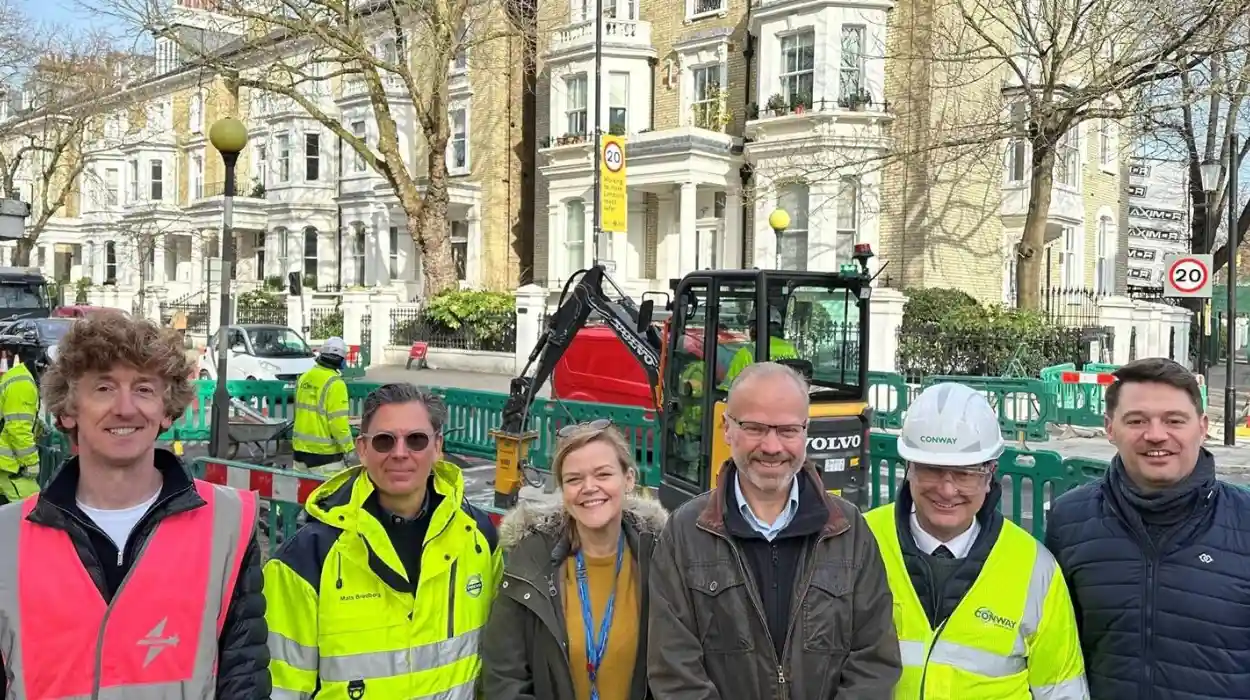Kensington And Chelsea (Parliament Politics Magazine) – Transport for London launches mobile charging trial in Kensington, with FM Conway, Volvo CE, SMT, and Charge Fairy for electric construction equipment operations.
Access to charging electricity is a problem for a lot of urban electric sites. Volvo CE started working with a UK start-up to find a solution to this problem.
The two businesses are now playing a key part in the UK’s first launch of a cutting-edge “on-demand” mobile charging van that will power multiple electric workplaces in London.
The creative solution from London-based start-up Charge Fairy helps to solve the problem of having a dependable electricity supply on demand by delivering electricity to the location via a charging truck anytime power is required.
By preventing electric machinery from having to leave the site to recharge, it seeks to streamline electric operation and increase uptime.
It is a trailblazing example of different but like-minded partners welcoming change and cooperating throughout the value chain to improve urban air quality and lower noise pollution.
An EC18 electric compact excavator and an L25 electric compact wheel loader were supplied by Volvo CE in collaboration with SMT GB to complete FM Conway’s work at three sites at Redcliffe Gardens, which is located in the Royal Borough of Kensington and Chelsea.
The site is the first in the UK to use mobile charging. In order to meet the Mayor of London’s goal of having the capital achieve net zero carbon emissions by 2030, TfL hopes that new technological developments like those being tested at the location will be essential.
Carl Eddleston, TfL’s Director of Network Management and Resilience, said:
“The health of everybody in London is central to our work, and we are determined to meet our 2030 net zero targets. That’s why I’m so pleased that we’re continuing to take these important steps to reduce emissions and protect air quality.”
The trial of electric construction vehicles at Redcliffe Gardens is such a vital part of achieving our goals, and our work with FM Conway, Volvo CE, and Charge Fairy shows how construction across our transport network can be environmentally conscious.
We are going to review the trial results and carry on exploring the best ways to decarbonise our network construction chain.”
The Charge Fairy team can dispatch a charging van to the location after receiving real-time reports on the machines’ charging levels while on-site, which is how the electric vehicles recharge.
The construction machines can be recharged in as short as an hour by using this way of carrying the charger to the car.
Ed Lea, Founder of Charge Fairy, said:
“As pioneers in mobile charging as a service, we’re excited to bring Charge Fairy technology to the construction industry.
We’ve long advocated that bringing energy to electric vehicles can make more sense than taking the vehicle to a charger—nowhere is this more true than with construction equipment.”
Our work at Redcliffe Gardens with TfL, Conway, and Volvo CE has demonstrated how intelligent energy delivery enables electric plants to operate for a full workday, overcoming one of the key challenges of construction electrification.”
Innovations in the powering and charging of building site vehicles have the potential to completely transform the design of the capital’s transportation system, making London healthier and greener for everyone.
Matt Tallon, Sustainability Director at FM Conway, said that FM Conway is always looking for ways to support Transport for London in reaching their net zero ambitions, and a strong supply chain filled with companies willing to innovate has been key in the delivery of this trial.
This bespoke charging solution removes many of the barriers we have faced in the use of electric plant machinery, and they have seen from the works on Redcliffe Gardens that it represents a viable option for similar sites in future.
How much will urban public health be drastically changed by electric construction?
Approximately 400 million tons of CO2 emissions per year, or 1.1% of all CO2 emissions worldwide, are caused by construction equipment. Furthermore, nitrogen oxides (NOx) and particulate matter (PM), two dangerous pollutants that can seriously impair human health, are released by compact construction equipment.
Compact machines do not need to utilize after-treatment systems to lower emissions of hazardous gases and particles, in contrast to heavy machinery that must adhere to stringent emissions regulations.
The roughly 5,000 small diesel excavators that operate in London now produce 152.7 tons of NOx and 8.1 tons of PM a year, which is the same amount of emissions as well over 100,000 diesel passenger cars.
Eliminating these damaging pollutants would be equivalent to taking 10% of London’s active automobiles off the road if these diesel compact machines were swapped out for electric ones.
Mats Bredborg, Electrification Leader for Volvo CE, said that many Londoners may not realise that the smaller diesel construction machines they pass by every day are entirely exempt from emissions controls.
This means they emit disproportionately high levels of harmful pollutants like NOx and particulate matter, contributing to poor air quality and posing serious public health risks.
That’s why initiatives like this are so important—bringing the industry together to deliver a fully operational, electric, zero-tailpipe-emission solution that helps create cleaner, healthier streets for London.


